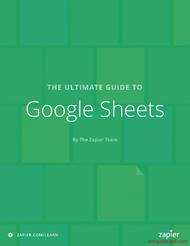Google Sheets Tutorial PDF: Ultimate Spreadsheet Guide
This Google Sheets Tutorial PDF is the ultimate guide to mastering Google Sheets. It covers everything from creating CRMs and analytics dashboards to automating tasks and using 50+ powerful add-ons. Learn how to write outlines, do research, create HTML tables, and more. Perfect for beginners and advanced users, this tutorial provides step-by-step instructions to help you unlock the full potential of Google Sheets. Whether you're managing business data or personal projects, this PDF is an essential resource. Download now to become a Google Sheets expert!
Learning the The Ultimate Guide to Google Sheets
Google Sheets is a versatile and powerful tool for managing data, and this Google Sheets Tutorial PDF is the ultimate guide to mastering it. Designed for beginners and advanced users alike, it covers a wide range of features and functionalities to help you get the most out of Google Sheets.
The tutorial starts with the basics, teaching you how to use online spreadsheets for the first time and create great forms for free. It then dives into more advanced topics, such as building a custom CRM that you can adapt to your needs and creating a custom analytics dashboard for your business.
You’ll also learn how to automate Google Sheets using Google Apps Script, enabling you to write custom tools and streamline your workflow. The guide includes a comprehensive list of 50+ Google Sheets add-ons that can enhance your spreadsheets, making them more powerful and efficient.
Practical tips and tricks are also covered, such as writing outlines, conducting research, and creating HTML tables directly within Google Sheets. Whether you’re managing business data, tracking personal projects, or collaborating with a team, this tutorial provides the tools and techniques you need to succeed.
With clear explanations, step-by-step instructions, and practical examples, this Google Sheets Tutorial PDF is the perfect resource for mastering spreadsheets. Download it today and take your data management skills to the next level!
| Level : | Beginners |
| Created : | February 11, 2019 |
| Size : | 9.61 MB |
| File type : | |
| Pages : | 186 |
| Author : | Zapier Inc |
| Downloads : | 19113 |
